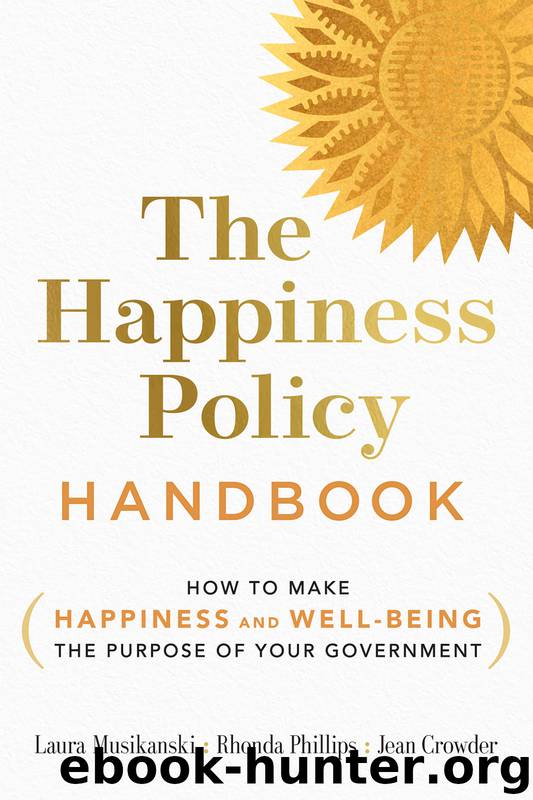The Happiness Policy Handbook by Laura Musikanski

Author:Laura Musikanski
Language: eng
Format: epub
ISBN: 9781771423137
Publisher: New Society Publishers
Published: 2019-03-12T16:00:00+00:00
The Happiness Index
The Happiness Alliance’s Happiness Index is a scientifically valid measure of happiness and well-being. The text of the survey and an online platform for surveying a population can be found online at happycounts.org. The survey methodology has undergone peer review.10
POLICY HIGHLIGHT
Reflections on the Dynamics of Happiness
by Dennis Meadows
Efforts to quantify and measure happiness are extremely important. They can help reduce the fabulous preoccupation with GDP as an indicator of well-being; they will orient us towards more sustainable policies; and they may encourage people to start identifying what is really important to them. Happiness reports reflect people’s interactions with complex social, economic, and physical systems. Happiness measures will be more useful when they better reflect one important behavior of those systems: “Better Before Worse.”
Actions that make systems seem better in the short term often sow the seeds of longer-term consequences that eventually make the system seem worse. This predicament is seen at all levels. For example, using more fossil energy to ease the rigors of life now, will cause greater destruction of the climate later. You may choose work over study now to raise your short-term income, but that means reduced income options in the future. Using a credit card now to raise consumption will mean that future consumption is lower than it could have been, once the bills come due. Taking another alcoholic drink typically makes you happier now, but at the expense of a bigger headache tomorrow.
I easily could cite many hundreds more examples. Most of us manage to avoid these traps, because we can foresee the future costs of current actions. If we conclude those costs will outweigh the short-term gain, we avoid the temptation of an immediate, transient pleasure. But when the costs occur far in the future, they may be invisible or ignored. Then we can become enmeshed in the “Better Before Worse” trap.
Imagine you have a magic button. Press it now, and you will be completely happy for the rest of your life. But you will be killed tomorrow by a meteorite strike. I expect you would not press the button. Now assume that the strike will come twenty years in the future. The button is much more tempting. We need to design happiness surveys, so that those who have pressed that Faustian button do not automatically appear at the top of the list.
There are two paths to happiness — get what you want, or want what you get. We live within systems that habitually turn to the first option. And because our leaders typically have very short-term perspectives, they ignore the woes they are storing up for us by giving us more now.
The science of measuring happiness will be more useful when it does not do that.
DENNIS L. MEADOWS is Emeritus Professor of Systems Management at the University of New Hampshire. He has been the Director of three university research institutes: at MIT, Dartmouth College, and the University of New Hampshire. He received four honorary doctorates from universities in the US and Europe for his contributions to environment and education.
Download
This site does not store any files on its server. We only index and link to content provided by other sites. Please contact the content providers to delete copyright contents if any and email us, we'll remove relevant links or contents immediately.
| Arms Control | Diplomacy |
| Security | Trades & Tariffs |
| Treaties | African |
| Asian | Australian & Oceanian |
| Canadian | Caribbean & Latin American |
| European | Middle Eastern |
| Russian & Former Soviet Union |
The Secret History by Donna Tartt(18963)
The Social Justice Warrior Handbook by Lisa De Pasquale(12171)
Thirteen Reasons Why by Jay Asher(8856)
This Is How You Lose Her by Junot Diaz(6842)
Weapons of Math Destruction by Cathy O'Neil(6223)
Zero to One by Peter Thiel(5741)
Beartown by Fredrik Backman(5687)
The Myth of the Strong Leader by Archie Brown(5470)
The Fire Next Time by James Baldwin(5392)
How Democracies Die by Steven Levitsky & Daniel Ziblatt(5181)
Promise Me, Dad by Joe Biden(5118)
Stone's Rules by Roger Stone(5058)
A Higher Loyalty: Truth, Lies, and Leadership by James Comey(4919)
100 Deadly Skills by Clint Emerson(4888)
Rise and Kill First by Ronen Bergman(4743)
Secrecy World by Jake Bernstein(4709)
The David Icke Guide to the Global Conspiracy (and how to end it) by David Icke(4662)
The Farm by Tom Rob Smith(4474)
The Doomsday Machine by Daniel Ellsberg(4460)
